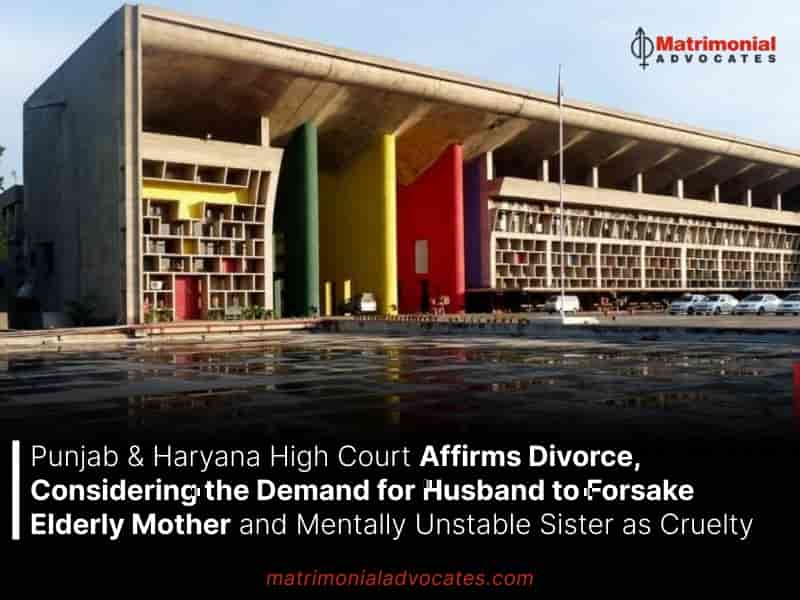
The appeal of a wife challenging the divorce decree granted to the couple under the Hindu Marriage Act was dismissed by the Punjab & Haryana High Court. The court stated that demanding the husband to forsake his elderly mother, aged around 75, and his mentally unstable sister amounted to “cruelty.”
Justice Sudhir Singh and Justice Harsh Bunger said, “It needs no reiteration that when one enters into matrimony, one surrenders a part of one’s absolute freedom for the good of both and for the harmonious life of two alongwith their children (if any). Therefore, one should adjust his/her life pattern in the light of his/her marital obligations.”
The Court underscored that the appellant’s insistence for her husband to live with her, disregarding his elderly mother and mentally unstable sister, was evaluated in accordance with the Supreme Court’s decision in Narendra v. K. Meena, [2016(4) RCR (Civil) 706], deeming it as an “act of cruelty.” The Court was presiding over an appeal filed by a woman challenging the divorce granted to a couple married in 1999, as decreed by a Family Court in Haryana in 2019. The husband had initiated the divorce proceedings in 2016, citing “cruelty” as the grounds. Following the arguments presented, the Court noted that since 2016, the woman, along with her two daughters, had been residing separately from her husband.
“From the evidence on record, it can be easily discerned that the appellant (woman) did not want to reside with the old mother and un-married sister of un-sound mind, of the respondent-husband,” said the Court.Top of Form
The record clearly shows that the respondent was responsibly looking after his elderly mother and mentally unstable sister, while the appellant expected the husband to forsake them without any consideration, stressed the Court.
Speaking for the bench Justice Harsh Bunger said, “it is a fact that the spouses have separated since 2016 and they have not been able to re-unite and lead a normal matrimonial life all these years. It has come on record that the appellant was not ready to reside with her old mother-in-law and unsound mind sister-in- law.”
The Court remarked, “Thus, it is logical to conclude that their marital connection has significantly weakened emotionally.”
The judge observed that the wife’s preference for separate living arrangements appears to stem from personal motives; otherwise, she could have sought reconciliation with her husband. The Wife Shows Little Interest in Restoring Marital Harmony
Furthermore, the bench noted that the woman has joined a spiritual group called ‘Brahma Kumaris,’ which advocates celibacy.
“As a circumstance to hold that the appellant does not seem to be interested in any conjugal bliss. It is well settled and as observed in the case of Samar Ghosh (), unilateral decision of refusal to have intercourse for considerable period without there being any physical incapacity or valid reason, may amount to mental cruelty,” the bench observed.
Considering the circumstances, the Court concluded that “the marriage between the parties has irreparably broken down, and attempts at reconciliation would only lead to prolonged discord, mental anguish, and cruelty if the divorce decree is reversed.”
Furthermore, in upholding the divorce, the Court highlighted the absence of any alimony awarded to the woman by the family court. It stressed that Section 25 of the 1955 Act permits the wife to pursue claims for permanent alimony post-divorce. Therefore, the Court maintains jurisdiction to grant alimony even after the decree has been issued.
Consequently, while safeguarding the wife’s right to seek permanent alimony, the Court directed the husband to provide an interim permanent alimony of Rs. 5 lakh to her within three months.




